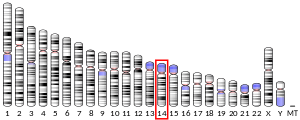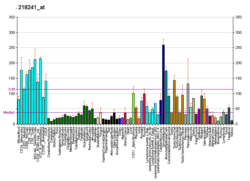GOLGA5
Golgin subfamily A member 5 is a protein that in humans is encoded by the GOLGA5 gene.[5][6][7][8]
| GOLGA5 | |||||||||||||||||||||||||
|---|---|---|---|---|---|---|---|---|---|---|---|---|---|---|---|---|---|---|---|---|---|---|---|---|---|
| Identifiers | |||||||||||||||||||||||||
| Aliases | GOLGA5, GOLIM5, RFG5, ret-II, golgin A5, GOLGIN 84 | ||||||||||||||||||||||||
| External IDs | OMIM: 606918 MGI: 1351475 HomoloGene: 38009 GeneCards: GOLGA5 | ||||||||||||||||||||||||
| |||||||||||||||||||||||||
| |||||||||||||||||||||||||
| |||||||||||||||||||||||||
| |||||||||||||||||||||||||
| Orthologs | |||||||||||||||||||||||||
| Species | Human | Mouse | |||||||||||||||||||||||
| Entrez | |||||||||||||||||||||||||
| Ensembl | |||||||||||||||||||||||||
| UniProt | |||||||||||||||||||||||||
| RefSeq (mRNA) | |||||||||||||||||||||||||
| RefSeq (protein) | |||||||||||||||||||||||||
| Location (UCSC) | Chr 14: 92.79 – 92.84 Mb | Chr 12: 102.47 – 102.5 Mb | |||||||||||||||||||||||
| PubMed search | [3] | [4] | |||||||||||||||||||||||
| Wikidata | |||||||||||||||||||||||||
| |||||||||||||||||||||||||
The Golgi apparatus, which participates in glycosylation and transport of proteins and lipids in the secretory pathway, consists of a series of stacked cisternae (flattened membrane sacs). Interactions between the Golgi and microtubules are thought to be important for the reorganization of the Golgi after it fragments during mitosis. This gene encodes a member of the golgin family of proteins, whose members localize to the Golgi. This protein is a coiled-coil membrane protein that has been postulated to play a role in vesicle tethering and docking. Translocations involving this gene and the ret proto-oncogene have been found in tumor tissues; the chimeric sequences have been designated RET-II and PTC5.[8]
Interactions
GOLGA5 has been shown to interact with RAB1A.[9][10]
References
- GRCh38: Ensembl release 89: ENSG00000066455 - Ensembl, May 2017
- GRCm38: Ensembl release 89: ENSMUSG00000021192 - Ensembl, May 2017
- "Human PubMed Reference:". National Center for Biotechnology Information, U.S. National Library of Medicine.
- "Mouse PubMed Reference:". National Center for Biotechnology Information, U.S. National Library of Medicine.
- Ishizaka Y, Ochiai M, Tahira T, Sugimura T, Nagao M (Jul 1989). "Activation of the ret-II oncogene without a sequence encoding a transmembrane domain and transforming activity of two ret-II oncogene products differing in carboxy-termini due to alternative splicing". Oncogene. 4 (6): 789–94. PMID 2734021.
- Klugbauer S, Demidchik EP, Lengfelder E, Rabes HM (Feb 1998). "Detection of a novel type of RET rearrangement (PTC5) in thyroid carcinomas after Chernobyl and analysis of the involved RET-fused gene RFG5". Cancer Res. 58 (2): 198–203. PMID 9443391.
- Oka T, Ungar D, Hughson FM, Krieger M (Apr 2004). "The COG and COPI complexes interact to control the abundance of GEARs, a subset of Golgi integral membrane proteins". Mol Biol Cell. 15 (5): 2423–35. doi:10.1091/mbc.E03-09-0699. PMC 404034. PMID 15004235.
- "Entrez Gene: GOLGA5 golgi autoantigen, golgin subfamily a, 5".
- Satoh, Ayano; Wang Yanzhuang; Malsam Jörg; Beard Matthew B; Warren Graham (Mar 2003). "Golgin-84 is a rab1 binding partner involved in Golgi structure". Traffic. Denmark. 4 (3): 153–61. doi:10.1034/j.1600-0854.2003.00103.x. ISSN 1398-9219. PMC 3282115. PMID 12656988.
- Diao, Aipo; Rahman Dinah; Pappin Darryl J C; Lucocq John; Lowe Martin (Jan 2003). "The coiled-coil membrane protein golgin-84 is a novel rab effector required for Golgi ribbon formation". J. Cell Biol. United States. 160 (2): 201–12. doi:10.1083/jcb.200207045. ISSN 0021-9525. PMC 2172652. PMID 12538640.
Further reading
- Short B, Barr FA (2004). "Membrane traffic: a glitch in the Golgi matrix". Curr. Biol. 13 (8): R311–3. doi:10.1016/S0960982203002343. PMID 12699642.
- Bascom RA, Srinivasan S, Nussbaum RL (1999). "Identification and characterization of golgin-84, a novel Golgi integral membrane protein with a cytoplasmic coiled-coil domain". J. Biol. Chem. 274 (5): 2953–62. doi:10.1074/jbc.274.5.2953. PMID 9915833.
- Strausberg RL, Feingold EA, Grouse LH, et al. (2003). "Generation and initial analysis of more than 15,000 full-length human and mouse cDNA sequences". Proc. Natl. Acad. Sci. U.S.A. 99 (26): 16899–903. Bibcode:2002PNAS...9916899M. doi:10.1073/pnas.242603899. PMC 139241. PMID 12477932.
- Heilig R, Eckenberg R, Petit JL, et al. (2003). "The DNA sequence and analysis of human chromosome 14". Nature. 421 (6923): 601–7. Bibcode:2003Natur.421..601H. doi:10.1038/nature01348. PMID 12508121.
- Diao A, Rahman D, Pappin DJ, et al. (2003). "The coiled-coil membrane protein golgin-84 is a novel rab effector required for Golgi ribbon formation". J. Cell Biol. 160 (2): 201–12. doi:10.1083/jcb.200207045. PMC 2172652. PMID 12538640.
- Satoh A, Wang Y, Malsam J, et al. (2003). "Golgin-84 is a rab1 binding partner involved in Golgi structure". Traffic. 4 (3): 153–61. doi:10.1034/j.1600-0854.2003.00103.x. PMC 3282115. PMID 12656988.
- Brill LM, Salomon AR, Ficarro SB, et al. (2004). "Robust phosphoproteomic profiling of tyrosine phosphorylation sites from human T cells using immobilized metal affinity chromatography and tandem mass spectrometry". Anal. Chem. 76 (10): 2763–72. doi:10.1021/ac035352d. PMID 15144186.
- Gerhard DS, Wagner L, Feingold EA, et al. (2004). "The status, quality, and expansion of the NIH full-length cDNA project: the Mammalian Gene Collection (MGC)". Genome Res. 14 (10B): 2121–7. doi:10.1101/gr.2596504. PMC 528928. PMID 15489334.
- Rush J, Moritz A, Lee KA, et al. (2005). "Immunoaffinity profiling of tyrosine phosphorylation in cancer cells". Nat. Biotechnol. 23 (1): 94–101. doi:10.1038/nbt1046. PMID 15592455.
- Malsam J, Satoh A, Pelletier L, Warren G (2005). "Golgin tethers define subpopulations of COPI vesicles". Science. 307 (5712): 1095–8. Bibcode:2005Sci...307.1095M. doi:10.1126/science.1108061. PMID 15718469.
- Olsen JV, Blagoev B, Gnad F, et al. (2006). "Global, in vivo, and site-specific phosphorylation dynamics in signaling networks". Cell. 127 (3): 635–48. doi:10.1016/j.cell.2006.09.026. PMID 17081983.




